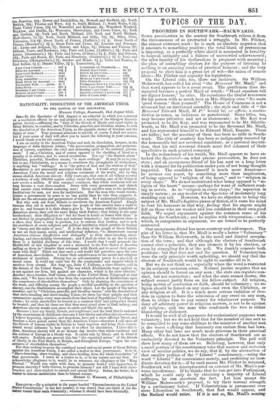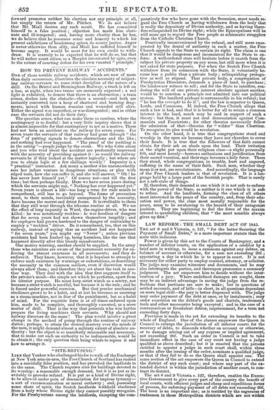TOPICS OF THE DAY.
PROGRESS IN SOUTHWARK—BACKWARDS.
SOME peculiarities in the contest for Southwark relieve it from the tiresomeness of so protracted a struggle. In Mr. Pilcher, the utmost extremes meet : he is such an absolute negation that it amounts to something positive ; the total blank of pretensions is imposing, as a perfectly white shield is accounted in heraldry to bespeak antiquity and a fulness of unrecorded achievements ; the utter inanity of his declarations is pregnant with meaning ; the plan of assembling electors for the purpose of listening to nothing is an amazing stroke of practical humour ; and the very proposal to elect him is a great act of wit—the union of remote ideas—Mr. Pilcher and capacity for legislation. On the Liberal side, too, there are incidents. Sir William Molesworth has called his rival " the Reverend Mr. Miall," and that word appears to be a great event. The gentleman thus de- signated becomes a perfect Miall of wrath : " Hand equidem tali me dignor honore," he cries. He repudiates the titular reverence for his person with as much heat as Mrs. Slipslop cries " No more 'good woman ' than yourself." The House of Commons is not a reverend but an irreverend assembly ; the style and title of " the Reverend Edward Miall, M. P." would be, ex officio, a contra- diction in terms, as ludicrous as paradoxical. Some titles, too, may become privative and act as abatements : as Mr. Kay was promote& to be Dr. Kay, and was repromoted to be Mr. Shuttle- worth, so Mr. Miall was promoted to be the Reverend Mr. Miall, and has repromoted himself to be Edward Miall, Esquire. These are trifles ; but the mooting of them has been no trifle in South- wark. The title of courtesy has been so indignantly resented by the honourable but not reverend candidate, as a personal imputa- tion, that his still reverend friends must feel ashamed of their appellative in such genteel company. In the redundancy of his wrath, Mr. Miall appears to have at- tacked the Speetator—on what precise provocation, he does not state ; and an anonymous friend of his has sent us a long letter with a demand for its publication under pain of not being thought impartial. The candidate himself is much more ferocious— he accuses our paper, by something more than implication, of being opposed to "religion of the heart," and to "religion in every shape." We do not understand what being opposed to "re- ligion of the heart" means—perhaps for want of sufficient read- ing in novels. As to "religion in every shape," the aspersion is simply untrue ; as any reader of the Spectator of moderately long standing can tell. However, we have no objection to being the subject of Mr. Miall's fugitive pieces of fiction, if it eases his mind to vent his humours in that way., feeling that his angers might fall on those who are weaker and less confident in their own rod faith. We urged arguments against the common sense of his standing for Southwark ; and he replies with vituperation,--with which, as antagonists in argument, we are bound to be perfectly contented.
Our anonymous friend has more courtesy and self-respect. The gist of his letter is, that Mr. Miall is really a better "Voluntary" than Sir William Molesworth, in the usual and limited accepta- tion of the term ; and that although the electors of Southwark cannot elect a principle, they can promote it by his election, or even by struggling for it at the poll. We frankly concede both positions : but that does not end the question. If Voluntaryism were the only principle worth upholding, we should say that the electors of Southwark would be right to sacrifice all to it.
But we do not think so ; especially when the word is restricted to its ordinary sectarian sense. Natural justice requires that no opinion should be forced on any man : the state can regulate con- duct, but not conviction ; and what the state cannot decree, the subject cannot justly force on his fellow-subject. All religion, being matter of conviction or faith, should be voluntary ; no re- ligion should be forced on any man—not even the Christian, or any religion at all. It is a much more serious violation of free- dom in opinion to force the admission of any creed on any man, than to oblige him to pay money for whatsoever purpose. To deny all arbitrary power in religious matters, is not to be against all religion ; and the man who confounds the two is either blundering or dishonest. It would be well if all payments for ecclesiastical purposes were voluntary ; but we do not hold that for the member of one sect to be compelled to pay some shillings to the minister of another seat is the worst suffering that humanity can endure from bad laws. Many other bad laws are much more grievous in their practical effects. We do not know that the electors of Southwark are BD exclusively devoted to the Voluntary principle. The poll will show how many of them are so. Believing, however, that only a small portion of the constituency take that narrow and sectarian view of secular politics, we do say, that if, by the abstraction of that smaller portion of the " Liberal " constituency,—using the word " Liberal" for convenience merely, and professing no inor- dinate devotion for it,—if by such means Mr. Pilcher be returned, Southwark will be misrepresented on account of Mr. Mialt's per- verse interference. If he thinks that he can get into Parliament, which he could only do by obtaining a majority of Liberal suffrages, he can ascertain the fact. Let him accept Sir William Molesworth's proposal, to try their mutual strength by a preliminary ballot. If Voluntaryism is paramount over mere Liberalism in Southwark, that fact would appear, anti -the Radical would retire. If it is not so, Mr. Miars -coming
forward promotes neither his election nor any principle at all, but simply the return of Mr. Filcher. We do not believe that Mr. Miall desires any such result. He has committed himself to a false position ; objection has made him obsti- nate and ill-tempered ; and, having more charity than he has, we do believe that he possesses sense and honesty to which his present exhibitions of headstrong spleen do scanty justice. Anger is never otherwise than silly, and Miall has suffered himself to become angry. It would be most for his own credit to with- draw. It is scarcely to be expected that he will do so, but that he will rather court odium as a Marplot intoxicated by spite, even to the extent of courting defeat for his own vaunted "principle."



























 Previous page
Previous page